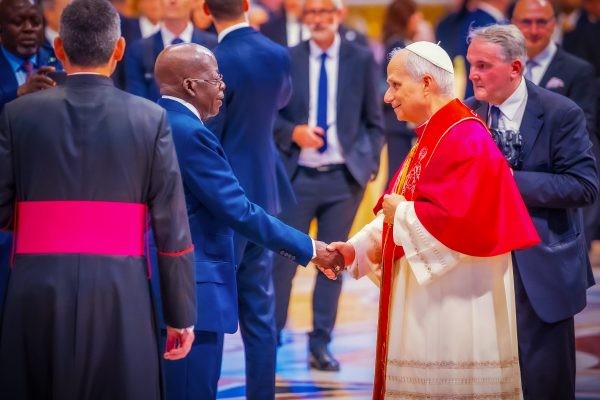Babachir Lawal, former Secretary to the Government of the Federation, has criticised President Bola Tinubu’s recent visit to the Vatican, describing it as a slight to the Christian community in Nigeria.

Lawal made the remarks during an interview on Arise Television on Wednesday, responding to the president’s attendance at the inauguration of Pope Leo XIV.
President Tinubu had joined other world leaders at the Vatican City to attend the papal inauguration and exchanged pleasantries with the Pope at the conclusion of the event.
However, Lawal dismissed the meeting as inconsequential, suggesting it could have been orchestrated by lobbyists.
“You know that going to see the Pope is just a matter of your lobby, how well you can lobby, how many friends you have out there in the Vatican that can lobby for you,” he said. “So it is not as if it’s a major achievement to visit the Pope on his inauguration. It can be arranged in advance by lobbyists, probably with the correct inducement. So, Bola Tinubu going to visit the Pope is a non-issue.”
Lawal, who had previously supported Tinubu’s candidacy during the 2023 presidential campaign, withdrew his backing after the then-candidate selected Kashim Shettima, a fellow Muslim, as his running mate. He has since remained a vocal critic of the Muslim-Muslim ticket, which he argues marginalises Christians in the country’s political landscape.
“It reinforces my earlier belief that the Muslim- Muslim ticket is an insult to Christianity. Had there been a senior Christian as vice president, it’s only expected that he would be the one to represent the government,” Lawal stated. “But now in Nigeria, we have a so-called Muslim visiting the Pope, leading a delegation of Catholics, eminent Catholics, to the Vatican. So it proves the fact that a Muslim-Muslim ticket is an unfair arrangement.”
Lawal further argued that a Christian vice president would have been more appropriate to lead such a delegation, calling the current arrangement a misrepresentation of Nigeria’s religious diversity. His comments come amid renewed debates over the religious balance in the country’s leadership and broader concerns
about inclusion and representation.







